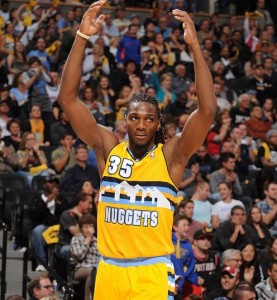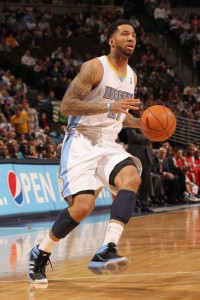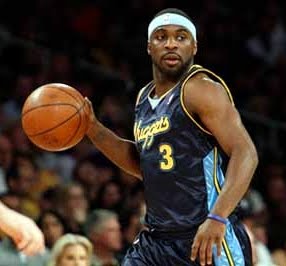 Of the eight teams that reached the Western Conference playoffs last season, six of them had at least one player among the NBA’s top-20 in win shares. The two playoff teams that did not have a player among the top 20 were Memphis, with stars Marc Gasol, Mike Conley and Zach Randolph, and San Antonio, who boasts the famed star quartet of Tim Duncan, Tony Parker, Manu Ginobili and Kawhi Leonard.
Of the eight teams that reached the Western Conference playoffs last season, six of them had at least one player among the NBA’s top-20 in win shares. The two playoff teams that did not have a player among the top 20 were Memphis, with stars Marc Gasol, Mike Conley and Zach Randolph, and San Antonio, who boasts the famed star quartet of Tim Duncan, Tony Parker, Manu Ginobili and Kawhi Leonard.
Obtaining, maintaining and sustaining a roster with All-Star level talent is essential if you want to have a consistent contender in the NBA. That lack of star power and a struggling defense are currently holding back the Denver Nuggets, losers of seven of their first nine games.
“We have a team that has to rely on depth to be successful,” Nuggets General Manager Tim Connelly told SheridanHoops. “We lack a superstar player, so as a team we have to be effective with its parts as opposed to relying on that one guy.”
Denver has an unquestionably talented and deep roster, but right now the team is performing poorly on both ends of the floor. Denver allows 108.2 points per game, the fourth-worst mark in the league, and its 110.9 defensive rating ranks 26th. Couple that with an offense whose team field goal percentage, 42.3, ranks 27th in the NBA and you’ve got a surefire combination for a poor start.
“I think depth could be a good thing, a positive thing, as long as there’s sacrifices and consistency with the guys who are trying to share within a 48-minute game,” said Arron Afflalo, who Denver re-acquired this past offseason from Orlando to further bolster that depth.
With quality depth comes the unenviable task of divvying up playing time. Every Denver player averages at least nine minutes played per game but only point guard Ty Lawson plays more than 30 minutes per game under head coach Brian Shaw. Lawson leads the team in points, assists, steals and free throw attempts per game.
“Ty Lawson is a guy who is hard to prepare for,” said New York Knicks head coach Derek Fisher. “You have no feel for how fast he is until the game starts.”
Fisher said that Denver plays with good pace and described their style of play as open and free. Denver’s 97.6 pace, or possessions per 48 minutes, is the third fastest in the NBA and has magnified the team’s shooting woes from the field so far because it allows the opposition to get more possessions after empty offensive trips of its own.
So where is Denver looking to improve?
“Everywhere you could imagine,” Shaw said. “Defensively, obviously, trying to figure out what’s the best pace for us to play at.”
“The weakside defense is probably the main thing we probably need to work on,” Lawson told SheridanHoops.
Another thing the Nuggets need to work on is letting the game get away from them in a given quarter or half. On Sunday in New York, Denver was outscored 31-8 in the second quarter and didn’t hit a field goal until Lawson’s layup at the buzzer.
“The games we lost this year, we had one quarter like that that we allow teams to get a lead so big we can’t come back from,” Shaw said. “We can’t wait to play in the second half.”
Four days before Denver allowed 62 first half points in New York, they allowed 84 points to Portland before halftime.
“We need to just play hard on defense,” said Nuggets forward Wilson Chandler. “Defense is the biggest thing and that’ll take care of our offense.”
With all due respect to Andre Iguodala, Chandler’s arrival in Denver, along with current teammates Danilo Gallinari and Timofey Mozgov, took place when the Nuggets traded their most recent bona fide superstar in Carmelo Anthony.
Lawson, Afflalo and Kenneth Faried, the summer’s U.S. national team breakout star, make for a good nucleus, but none of them are premium players at this point.
ESPN’s most recent ranking of the top 500 NBA players listed Faried at 42 and Lawson at 45. These rankings are still relatively arbitrary and hardly definitive, but 12 Western Conference teams had players ranked higher then Denver’s top player and eight of those teams had multiple players higher up on the list.
A lot of those Western Conference star-laden teams come from small markets like Denver.
“A lot of small market teams have elite, top-20, top-30 players,” Connelly said. “I don’t think it’s the market size. I think it’s the hand we’ve been dealt and we’ll make it work.”
The aforementioned ex-Knicks trio contribute to the team’s superior depth, and go with a formidable bench including veterans Randy Foye, Nate Robinson, J.J. Hickson, JaVale McGee and Darrell Arthur and promising rookies Gary Harris and Jusuf Nurkic.
 After reaching the playoffs in 2011, 2012 and 2013, Denver was in the lottery last season and are off to a bad start this year in the early going.
After reaching the playoffs in 2011, 2012 and 2013, Denver was in the lottery last season and are off to a bad start this year in the early going.
“When we first all got together,” Chandler said, presumably referring to the Anthony trade, “we didn’t have a star then. We just need to buy into the new system and pay attention to the things coach says.”
Lawson and Chandler have been on Denver teams where depth without a star led to successful seasons and the pair remains optimistic about this season.
“We’ve got chemistry together,” Lawson said. “I think we’re still working out who’s on the court, how we play together defensive and offensive-wise, who’s making most of the plays and things like that. Once we figure the chemistry out I think everything will take care of itself.”
“I don’t think it’s the star component,” Chandler said. “I just think we need to buy in.”
For Denver to be successful without an All-Star level player, chemistry, continuity and improved defense will be important for the Nuggets to reassert themselves as the conference’s star-less market inefficiency.
Shlomo Sprung is a national columnist for SheridanHoops who loves advanced statistics and the way they explain what happens on the court. He is also the web editor of the Brooklyn Daily Eagle. A 2011 graduate of Columbia University’s Journalism School, he has previously worked for the New York Knicks, The Sporting News, Business Insider and other publications. You should follow him on Twitter.
